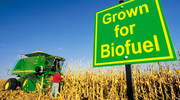World Agrinews
German plans to end crop-based biofuels would hit farmers, cut rapeseed output
Any German government plans to stop crop-based biofuel production would severely hit farmers and cut rapeseed output, Thomas Mielke, CEO of Hamburg-based oilseeds analysts Oil World said on Wednesday.
- Read more
- 939 reads
Brazil and Argentina to discuss common currency
Brazil and Argentina aim for greater economic integration, including the development of a common currency, Brazilian President Luiz Inacio Lula da Silva and Argentine leader Alberto Fernandez said in a joint article they penned.
"We intend to overcome the barriers to our exchanges, simplify and modernize the rules and encourage the use of local currencies," says the text published on the Argentine website Perfil.
- Read more
- 855 reads
Soybeans fall on record Brazil crop expectations
Chicago soybean futures lost ground on Tuesday, with prices dropping for the first time in four sessions, as expectations of an all-time high Brazilian crop and concerns over economic growth in top consumer China weighed on the market.
Wheat fell, while corn slid from a two-week high.
- Read more
- 846 reads
World food prices dip in December
FAO Food Price Index ends 2022 lower than a year earlier.
The index of world food prices dipped for the ninth consecutive month in December 2022, declining by 1.9 percent from the previous month, the Food and Agriculture Organization of the United Nations (FAO) reported today.
- Read more
- 913 reads
Global economy faces tougher year in 2023, IMF's Georgieva warns
For much of the global economy, 2023 is going to be a tough year as the main engines of global growth - the United States, Europe and China - all experience weakening activity, the head of the International Monetary Fund said on Sunday.
The new year is going to be "tougher than the year we leave behind," IMF Managing Director Kristalina Georgieva said on the CBS Sunday morning news program "Face the Nation."
- Read more
- 1166 reads
Export of cheeses from the EU decreased by 4%
For the period January-July 2022, the volume of cheeses exported from the EU decreased from 562.7 thousand tons to 538.3 thousand tons, sources in the EU reported.
- Read more
- 1595 reads
Russia's attack on Ukraine had a negative impact on Ecuador's banana sector
Russia's war against Ukraine puts additional pressure on the already tense global logistics, as container shortages and rising production costs are among the factors affecting the fruit industry.
Richard Salazar, executive director of the Ecuadorian Banana Association ACORBANEC, assessed the impact of the war on Ecuador's banana exports and outlined the challenges facing the industry.
- Read more
- 2962 reads
Western countries accuse Russia of using the food crisis as a weapon
More and more world leaders are realizing that the war is affecting not only Ukraine but virtually the entire world, including its global food security.
- Read more
- 4810 reads
EU introduces quotas for import of fertilisers from Russia
The European Union, as part of the next package of sanctions, has limited the import of fertilisers from Russia.
The restrictions do not apply to deliveries before July 10 under contracts concluded before April 9 this year, according to the Official Journal of the EU.
- Read more
- 3809 reads
Copa and Cogeca step up pressure on EU biofuel plans
Ahead of talks between the EU institutions on the EU’s renewable energy Directive, Copa and Cogeca sent a joint letter today urging the EU to follow the Council’s general approach to have true targets for renewable energy sources to decarbonise the transport sector. Copa and Cogeca believe that the EU should have a a binding blending obligation on fuel suppliers of at least 14%, without technological restrictions.
- Read more
- 1863 reads


















